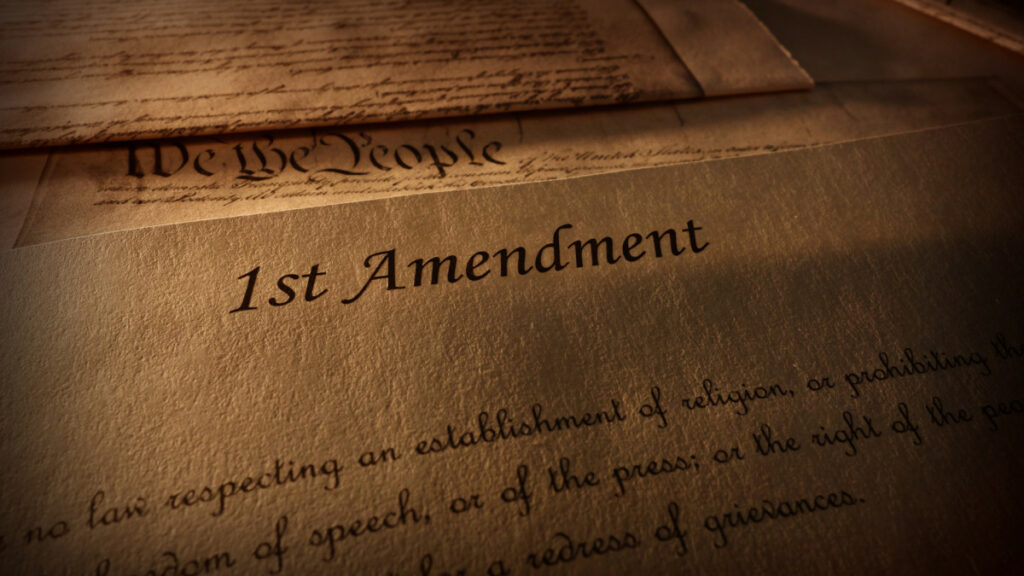
Introduction
The U.S. Constitution, a masterful framework for governance, remains a beacon of democracy and the rule of law for nations around the world. Among its tenets, the First Amendment stands particularly tall, ensuring five core freedoms: religion, speech, press, assembly, and petition. These rights have enabled Americans to shape their nation through expression, discussion, and dissent. Of these, the freedom of speech is particularly salient in the modern digital era. As our society becomes increasingly connected, the battleground for free speech has shifted from town squares and newspapers to social media platforms and online forums. The influence of big tech on public discourse is now undeniable. With that influence comes responsibility, but are these tech giants overstepping their bounds and suppressing freedom of speech?
The Importance of the First Amendment
The Founding Fathers, having experienced the tyranny of the British monarchy, knew the importance of a free and open society. The First Amendment encapsulates this vision:
“Congress shall make no law respecting an establishment of religion, or prohibiting the free exercise thereof; or abridging the freedom of speech, or of the press; or the right of the people peaceably to assemble, and to petition the Government for a redress of grievances.”
This powerful statement, concise yet sweeping, ensures that every American has the right to voice their beliefs, criticize their government, and gather in protest without fear of retribution. This freedom of speech is more than just a legal right; it’s a foundational principle of American democracy.
Freedom of Speech: A Pillar of American Values
Freedom of speech enables a marketplace of ideas, where truths can emerge from unfettered debate and discussion. History is filled with examples of unpopular or controversial ideas, initially suppressed or ridiculed, that later become widely accepted truths. From civil rights to women’s suffrage, free speech has empowered marginalized voices, catalyzing societal change.
Big Tech and the Modern Public Square
In the 21st century, traditional venues for free expression have been complemented, and in many cases replaced, by digital platforms. Sites like Facebook, Twitter, and YouTube have become the new public squares, where billions gather to share their thoughts, ideas, and criticisms.
But unlike traditional public squares, these platforms are owned by private entities. These entities can establish rules, enforce standards, and curate content in ways that governments, bound by the First Amendment, cannot. The question then arises: to what extent should these platforms regulate speech? And more importantly, when does curation become censorship?
The Controversy: Big Tech Censorship
As these platforms grow in influence, accusations of bias and censorship have become more pronounced. Critics argue that these platforms, often driven by their own political leanings or external pressures, are suppressing certain views and manipulating public discourse. Here are some key points of contention:
- Algorithmic Manipulation: Social media platforms employ algorithms to curate content, aiming to keep users engaged. However, these algorithms can also create echo chambers, where users only see content aligned with their beliefs. This narrows the scope of public discourse, marginalizing diverse opinions.
- Direct Censorship: There have been several high-profile cases where platforms have de-platformed individuals or suppressed certain content, citing violations of community standards. Critics argue that these actions are inconsistent and reflect underlying biases.
- Fact-Checking and Misinformation: In the age of fake news, platforms have taken on the role of arbiters of truth, labeling or removing content they deem misleading. While this is crucial in preventing the spread of harmful misinformation, it becomes problematic when the line between fact-checking and editorializing is blurred.
The Consequences of Suppression
When tech giants control the narrative, it breeds distrust. A society that can’t trust its sources of information risks becoming polarized and fragmented. Freedom of speech doesn’t merely allow dissent; it requires it. Suppressing speech, even under the guise of preventing harm or promoting civility, can have profound consequences:
- Loss of Trust: If people believe that their voices are being suppressed, they’ll lose trust in these platforms as neutral grounds for debate.
- Polarization: When individuals feel marginalized, they retreat into echo chambers that amplify their views without challenge, leading to further division.
- Stifling Innovation: A true marketplace of ideas allows for innovation and progress. Suppressing dissenting opinions can hinder societal evolution.
Moving Forward: A Balance Between Freedom and Responsibility
The challenge lies in finding a balance. Platforms have a responsibility to prevent harm, but they also bear the onus of ensuring that the fundamental principles of free speech aren’t compromised. Here are some proposed solutions:
- Transparency: Platforms can be more open about their content moderation policies and processes. This includes clarifying the workings of their algorithms.
- Decentralization: Encouraging decentralized social media platforms can ensure that no single entity has excessive control over public discourse.
- Legal Protections: Governments can consider regulations that protect free speech on these platforms, similar to how public utilities are regulated.
- User Empowerment: Give users more control over their feeds and the content they see, reducing reliance on opaque algorithms.
Conclusion
The First Amendment’s freedom of speech remains a cornerstone of American democracy. As we navigate the digital age, it’s imperative that this freedom is not just protected but championed. Big tech platforms, as the new custodians of public discourse, have a monumental responsibility. Their actions will shape not just the future of American discourse, but the very essence of democratic values worldwide.
